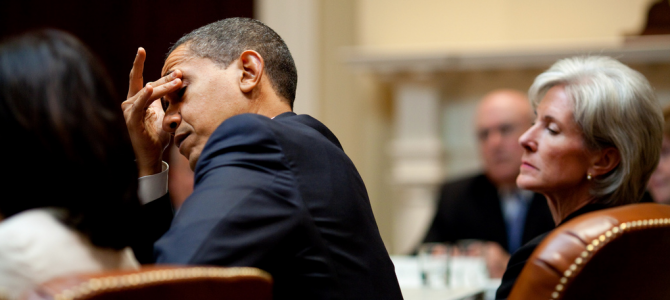
Consider for a moment what will come next for Obamacare, in the context of Ezra Klein’s five thoughts on the disastrous launch of the program – a bellwether of sorts for how the administration failed to live up to the expectations it sold to the law’s supporters and opinion leaders. There are a few different directions it can go from here, but the worst case scenario hasn’t really entered people’s consciences yet, in part because the insurers are staying quiet at the moment. The reality now is that the system is at least a month from actually working, and likelier two or (gasp) three, given the enormous range of problems. And that could make for a real disaster.
As it stands today, at most nine of the state exchanges are working… but while some systems are being announced as “fixed” on the state level, fixed in this case means the ability to look at plans, not to actually enroll. And the fundamental breakdown for the federal exchange hangs on a decision designed to insulate people from the true cost of plans – an approach which is now backfiring given the load it places on the website. The whole storyline is marked by a disturbing failure of basic technocracy: according to the New York Times, as late as the last week of September, HHS officials were still debating aspects of the site, including that requirement making customers register before shopping for insurance.
Democrats are scrambling for excuses: there wasn’t enough money or time. The decision to delay controversial regulations til after the 2012 election slowed the process. The Republican governors ruined efforts by opting not to implement exchanges. The suggestion that cronyism played a role in the contractor process is already being advanced. But cronyism or no, the decision of those at CMS/HHS to take the lead in organizing the program – despite an enormous absence of institutional experience – may be the real source of the problem. Megan McArdle outlines the reality:
I’m a longtime critic of federal contracting rules, which prevent some corruption at ruinous expense in money, quality and speed. But federal contracting rules are not what made the administration delay writing the rules and specifications necessary to build the system until 2013. Nor to delay the deadline for states to declare whether they’d be building an exchange, in the desperate hope that a few more governors might decide – in February 2013! – to build a state system after all. Any state that decided to start such a project at that late date would have had little hope of building anything that worked, but presumably angry voters would be calling the governor instead of HHS. Federal contracting codes, so far as I am aware, do not emit intoxicating gases that might have caused senior HHS officials to decide that it was a good idea to take on the role of lead contractor – a decision equivalent to someone who has never even hung a picture deciding that they should become their own general contractor and build a house. Nor can those rules explain their lunatic response when they were told that the system was not working – “failure was not an option.”
But whether these excuses work with the public or not, the worst case scenario for Obamacare is now entering the realm of possibility: what if it just doesn’t work, and continues not to work, a month from now? The deadlines for achieving coverage are approaching fast. The political reality is that it’s impossible to legally require people to sign up for something when the system just won’t let them. If a month from now we are still seeing a fail rate of significance within these systems, where people trying to enroll are turned away as often (or more often!) than they get through, the pressure from non-partisan actors is going to explode for a delay of major aspects of the law. It will be a murmur at first, but if it continues to grow, there will have to be a Congressional response.
One factor to consider here is that the consultants involved for the federal and state exchanges have a good deal of overlap. It would be one thing if it were just a few states having issues – they could prioritize the major states over the minor ones – but the fact that the problems are worst for the federal exchange means none of the states are going to get significant attention until that’s taken care of. This could mean smaller states get attention last, leaving their citizens incapable of purchasing the coverage they’re legally required to get. The potential for legal challenges coming out of this is massive if the mandate/penalty is not delayed. But to solve the practical problem requires steps beyond just the individual mandate delay or extending open enrollment for the entire year – we’re talking about actually taking the exchanges offline (insurers would presumably honor the handful of plans already sold through them) in order to fix them. That process could take months of work and millions more in taxpayer dollars… and set us up to do this whole thing again in October of 2014.
So what’s the worst case scenario? Honestly, it’s this: if this is as big of a failure as it looks like at the moment, and the problems are not fixed within the next two months, the Obamacare project could end up backfiring in a way that could have dramatic effects on politics and policy going forward. It will contribute to distrust in government’s basic capability. It will fail to live up to its promise, and wreck the insurance markets for no good purpose. It will represent the administration betraying its strongest supporters. And it may ultimately leave President Obama wishing John Roberts had ruled the other way – turning him into a martyr for the cause as opposed to putting the burden of proof on actually implementing his signature policy.









